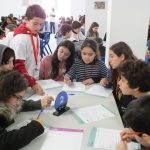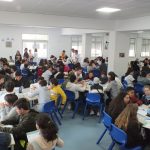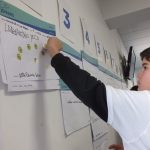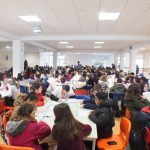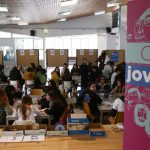
Cascais Youth Participatory Budget
Description
Cascais has a well developed model of Participatory Budgeting running over 5 years. Young people can also be actively involved through the school participatory budget. Each school has a EUR 10,000 budget for implementing its own selected ideas. Beyond that, young people can propose suggestions for inclusion within the city wide budget, and three such projects have been selected in recent years. These projects were digital bus stops (WIFI enabled shelters with solar power charging sockets), creating ‘social benches’ where young people can come together (and also charge their devices) and a Festival of Youth Cinema.
Preparation
The objectives of the Cascais Youth PB are to develop an appetite for participatory democracy from an early age, and to bring young people closer to the political and policy decisions which concern them. The promotion of civic education is an important target of the City Council. At the end of each Youth PB cycle, the participation of the school community is made visible through the implementation of projects proposed by young people within their school.
The students also have their proposals for the wider city recognised and these are taken into account by the City Council. The visible realisation of the value of their participation is felt important for fostering their future participation as citizens, for the realisation of their rights, and to build understanding of their duties as citizens. Through running this process the City of Cascais believes young people will become more committed to the building of a more just, equitable and tolerant society.
Within the city guide to school participatory budgeting a number of deeper goals are listed:
- Personal and social development through education for citizenship;
- Encourage entrepreneurial dynamism among young people;
- Greater involvement in the school culture and to improve the school’s relationship with the community;
- Develop a understanding of participatory democracy;
- Create an opportunity to identify common values;
- Bring the voice of youngsters closer to policy makers.
- Develop management, decision making, motivational and relationship skills through practical simulations;
- Financial and personal budgeting education;
The project had a strong pedagogical component where young people are encouraged to be the actors and builders of the process. For each of the stages, actions of preparation, construction, and follow-up were developed to try to place youngsters within leadership roles.
Projects of up to 2,500 euros can be proposed that take place within the perimeter of schools within that year. They must be compatible with existing projects or school and municipal plans already underway, be in accordance with the School's Internal Regulations and align with the Student Statute.
Additionally projects up to 300,000 euros can be proposed to be completed within 2 to 3 years in any part of the county. The proposals most voted by students progress directly into the technical analysis phase of Cascais citywide Participatory Budget. They are within any of the following categories: green spaces, culture, recreational equipment, sports, public roads and transport, urban furniture, accessibility and smooth mobility, administrative modernization, health, social action, environmental protection and energy, rehabilitation of buildings, urban redevelopment of public space, sanitation and hygiene urban, security and civil protection, tourism, trade and economic promotion, cultural and historical heritage, and animal protection.
Within the forward to the 2017/2018 guide to the youth PB in Cascais the Mayor says:
“There are those who misjudge young people. It is said that young people do not want to vote, that young people are not interested in public affairs, that young people simply do not care about their responsibilities. I do not agree with any of this. What life has taught me is that young people are as committed to the affairs of the city and the country as all other citizens... the overwhelming majority of the entrepreneurs are young... The problem is not youth. The problem is a society that does not know or does not want to point out the ways of political participation to youth... The Young PB is a small, but solid step in the right direction, to bring the youth of Cascais to the centre of the debate, to the centre of the decision. It’s a way of showing that we should never let others decide for us.”
Carlos Carreiras, Presidente da Câmara Municipal de Cascais.
In April 2018 the city was the winner of the “Good Practices of Citizenship in Portugal 2017” prize, awarded by Participa (the Participatory Municipalities Network of Portugal.)
Implementation
The following stages are laid out within the 2018 guide for youth PB in Cascais.
A preparation stage including training for teachers, sessions with teams of young people to introduce the themes and rules of the Youth PB programme, a presentation and approval of the rules with in a Town Hall meeting and the development of operational plans and implementation rules.
In a 2016 pilot phase four schools participated. Based on that learning in 2017/18 this was expanded to fourteen schools. The calendar of events was as follows:
September 2017: Preparation Process including meetings with all school group directors.
October 2017: Training of citizenship and youth participation teachers from each school including using active non-formal education methodologies. There were also individual meetings in each school.
October 2017 to January 2018: Up to 10 training sessions took place in each school for groups of young people. These sessions were facilitated by municipal’s Youth PB team, an external educational games company, and a local youth association. Each group created a communication sub-team that shared its learning through social networks.
November 2017: Weekend workshop of a group of 28 youngsters and 15 teachers (2 youngsters and 1 teacher per school) for discussion and joint approval of the Cascais Youth PB rules. The youth participants were drawn from those who had received one of the training sessions.
January 2018: Rules approved in a formal meeting and public launch of the process through the placement of a large banner at the school entrance, through posters and dissemination in social networks such as Facebook and Instagram. There were also awareness sessions for volunteers, council officers and parents. In the last week of January there were the initial development and voting of proposals at 34 public participation sessions within fourteen schools.
A shortlist was developed of 8 proposals within each school and also the most popular proposals for the wider community. 2208 young people participated, including 378 who had received training in the formal classroom sessions, there was total of 519 proposals presented, of which 275 were submitted for further technical analysis. There were also 249 proposals for community projects presented, of which 34 submitted to further technical analysis.
February 2018: Projects are reviewed for feasibility. This included the involvement of the Youth PB ‘classes’ in financial analysis of at least some of the presented proposals. The technical analysis concluded with meetings involving school groups, teachers, elected students, and the municipal Youth PB team to agree the feasibility of the school projects so they could progress to the voting stage.
March 2018: Voting campaign with dissemination through posters, flyers and promotional video on social networks. Between the 19th and 22nd March 2018 a total of 6,456 votes were registered, which correspond to a participation rate of 49% of the total population of the 14 schools involved in the project.
In May and June 2018 informal ceremonies were held in each school announcing which projects had won. Further the selected community projects were presented within the last public participation session of the citywide Participatory Budget 2018 before being sent for further technical analysis. Typical proposals for community based projects included an outdoor cinema, park improvements including specific areas for young people, sports centre changing rooms and benches with mobile phones charger in places frequented by young people.
In June 2018 there was a celebration picnic for all involved, including students involved in the citizenship classes, teachers, local youth association and the Federation of Parents Association, with activities based around the Youth PB thematic proposals and also other team building activities.
Ways of engaging young people
Young people primarily participated within formal sessions within school classes linked to citizenship education. These young people led the process within each school and encouraged their peers to participate in the generation of proposals and within voting sessions.
The use of gamification and creative educational approaches was supported by involving external companies specialising in these techniques. Each school also involved its school council made up of elected youth representatives, and more informally there were further means of engaging through local youth clubs and associations.
Role of young people
- Participants
- Beneficiaries
- Helpers
- Organizers
- Managers to deliver the process
Positive aspects of the project/process
Edited observations by Nelson Dias, Coordinator of the Portuguese Participa Network, on the value of Youth PB in Cascais, written in 2016 after the pilot programme.
“Uniquely the Cascais Youth PB was the only one I know who dared to give the participants the power to draw the rules of the process. These were defined as part of a collaborative game designed specifically for the purpose. This resulted in a document with the participation rules, which was presented first to the Mayor, and secondly to the entire Council Executive, which accepted without changes and by majority approval the proposals of students. In this way the Cascais Youth PB surpassed symbolism, becoming an act of democratic deliberation, which transformed a proposal conceived by young people between the ages of 11 and 13 into a municipal regulation.
Nowadays, it is more or less evident that there are lack means to ensure an effective education of young people in democracy and citizenship. Against this background, all practices whose aim is to encourage civic and political participation of younger generations in the daily life of their municipality are important. This is where the Cascais Youth Participative Budget experience fits in.
The Cascais Youth PB questions negative perceptions about young people, showing that youngsters are not a ‘postponed future’ but a ‘confirmed present’. They are not the citizens of tomorrow, but the citizens of today.
Above its role in building financial literacy and the symbolic financial participation of young people Youth PB must above all be understood as an educational project towards the construction of citizenship rights and for training our younger population in the exercise of participation and democracy. Thereby contradicting the often widespread idea of their inability to reflect upon [and care for] what surrounds them in their municipality, on their street, in their neighbourhood or at school, or towards finding solutions for common wellbeing.
When well conducted, these initiatives allow young people early in their life to understand the value of money, the costs that are associated to the implementation of a project, the difference between the characteristics and functioning of local and central public power. Enabling learning on what are the responsibilities of the public and of the private sectors, the difference between operating and investment expenses, among many other essential aspects. Youth PB has through its practical nature an immense potential to become a highly educational training process for its participants.
This initiative contradicts the often-generalized tendency to reduce citizenship to voting, by demonstrating that those who are not yet old enough to vote also have valid ideas and useful thoughts for the construction of the collective wellbeing.”
At a conference hosted by the European Youth Regional Networks held in Cascais in 2018, Soraia Carvalho, head of the environmental department at Cascais municipality, commented that local administrations do have the means to reach out to young people and accompany them in developing co-creation initiatives to meet the UN 2030 Sustainable Development Goals and thus ensure a sustainable future.
Further, Bruno Antonio, Coordinator of DYPALL Network–a Portuguese association that aims to promote youth participation at local level, pointed out that global citizenship means adopting critical thinking in the era of information technology, bringing about an educational shift from competition to cooperation in order to build a free democratic society, and tackling disaffection among young people by enabling more participatory platforms for inclusion.
Main obstacles to the project/process
Nelson Dias, Coordinator of the Portuguese Participa Network has contributed the following two obstacles: one institutional and the other cultural:
Institutional. A negotiation between the Municipality and the Schools was necessary in order to be able to adjust the Youth PB programme, in terms of methodology, calendar, participation session times etc to the functioning of the schools. The workload and teaching programmes in schools in Portugal are very demanding. This makes it difficult to add new activities that involve time for students and teachers. In Cascais the negotiation had a good result but it is not always like this in other places.
Cultural. The culture of schools and especially of teachers is a problem for an activity like PB. Teachers are not always used to letting students think openly and especially decide what is best for them. Every year (every PB cycle) a training is organised and actions are developed with teachers so that they learn to trust their students and not influence their ideas and the results of PB. This has been a very rich process of learning and cultural change.
Opinion after implementation
Within the guide to youth PB in Cascais the following evaluation was produced by young people:
Strengths:
- Interaction between classes, helping those who need help, solidarity
- We succeeded in achieving our goals
- Teamwork
- Students understood that they are important as well as adults
- Important for the future
- Getting good ideas
Improve:
- Organisation
- The communication
- Student behaviour
- Have more participants
What we learnt:
- About being a moderator
- How to improve school
- How to make use of more games
- How to express myself better
- How to participate more
- Going deeper into democracy and [being a member of ] the republic
- Learnt more about Cascais municipality
Accountability of resources
The resources came for the city budget of Cascais, and approved by the Mayor and the city council executive. Each school then had its own budget of 10,000 euro to spend on its proposals.
1-3 tips (advices, warnings) from organizers or participants
If the youth participatory budgeting process is the result of a partnership between a local government and a school, it is advisable to create a letter of commitment between them, which defines the rules of the process and the contributions of each partner.
In defining the methodology, all the conditions must be ensured so that young people can decide which proposals they want to submit without suffering any kind of influence or pressure from adults (such as teachers, relatives, etc.).
If possible, involve the young people in the initial definition of the rules of the process. This provides a very rich learning experience and a deeper process.
Links to examples of application forms, voting styles, tools
2017/2018 Guide to Youth PB in Cascais (PDF download):
https://www.google.com/url?sa=t&rct=j&q=&esrc=s&source=web&cd=&ved=2ahUKEwjVkv-J-eLpAhWYSBUIHcCOCMEQFjADegQIAxAB&url=https%3A%2F%2Fliberopinion.s3.amazonaws.com%2Fop.cascais.pt%2Forcamento-participativo%2Fundefined%2Fpublicacoes%2Fundefined%2FDykNuDb3.pdf&usg=AOvVaw3anOxkZ41741APGAPbs52Y
Youtube video of Cascais youth PB (Portuguese with subtitles):
https://www.youtube.com/watch?v=-LeaP8yr7tE&feature=youtu.be
Article on the Participatory Budgeting work of Cascais on the Urbact Website:
https://urbact.eu/cascais%E2%80%99-participatory-budget-inspiring-example
Blog on the Urbact website on youth PB in Cascais:
https://www.blog.urbact.eu/2018/08/cascais-bets-on-its-young-people/
Information on the Cascais city points rewards programme:
https://www.worldsummitawards.org/winner/city-points-cascais/
OIDP article on Participatory Budgeting in Cascais:
https://www.oidp.net/docs/repo/doc231.pdf
Workshop of the European Youth Regional Network held in Cascais in 2018:
https://aer.eu/inspiring-debates-at-the-yrn-autumn-plenary-in-cascais-2018/
